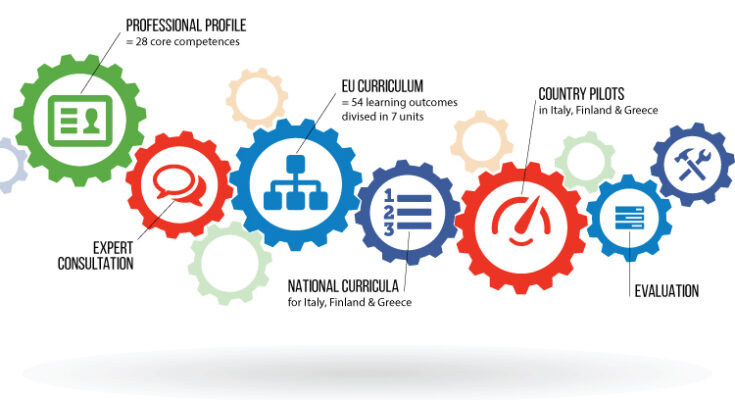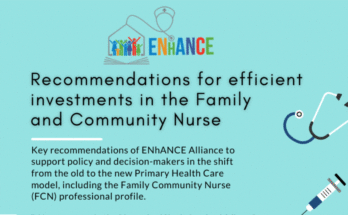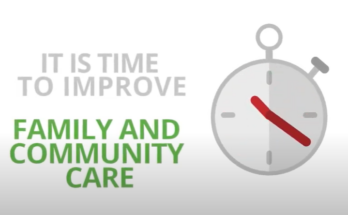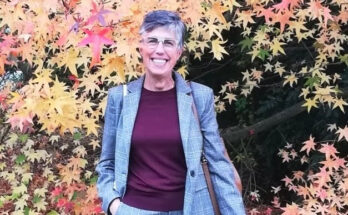Welcome to the second ENhANCE newsletter
Although the Family and Community Nurse (FCN) has been identified as a highly specialized nurse and key member of the primary care team providing community-oriented care, no European curriculum currently exists that details the knowledge, skills and competencies for graduate nurses in this specialty. The ENhANCE project (funded through the EU Erasmus+ Programme) recently released its first version for a European FCN curriculum was released, modelling a framework for specialized nursing education (EQF 7) and targeting graduate nurses.
The European Family and Community Nurse (FCN) Curriculum, is envisaged to contribute to:
- a basis for developing specialist educational programmes (Masters’ degrees, masters’ courses, or even Continued Professional Development);
- higher professional standards and quality care;
- increased visibility and attractiveness for this Specialist Nurse delivering person-centred and community-oriented primary care;
- better career opportunities for graduate nurses working in primary care;
- a more integrated partnership between patients, informal carers and community health service providers;
- the development of Practice Sharing through formal, non-formal and informal learning.
- the transferability of certifications and professional mobility.
FCN specialization courses based on the ENhANCE European FCN Curriculum are currently being piloted at 3 higher educational institutes – University of Eastern Finland (UEF); University of Thessaly (UTH) and University of Genoa (UNIGE). This will provide crucial feedback before final validation and release of the European FCN Curriculum at the end of 2020.
For more information about the ENhANCE Alliance visit, www.enhance-fcn.eu
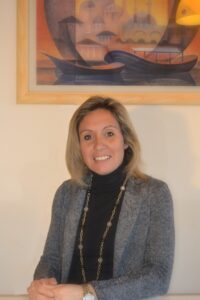 Meet Serena who led the team to develop the ENhANCE European FCN Curriculum
Meet Serena who led the team to develop the ENhANCE European FCN Curriculum
Serena Alvino, PhD, is project coordinator at SI4Life, a Genoa-based SME and consortium including companies, healthcare facilities and third sector operators involved in educational, research and innovation projects at regional, national and European level, in the field of health. The mission of SI4LIFE is to improve the quality of life of frail, older adults or persons with disabilities. She has coordinated EU projects in similar domains such as the SSA-EU project CARESS (focusing on homecare professionals) and is also actively involved in the European Innovation Partnership (EIP) on Active and Healthy Ageing. Her main research and professional interests are in educational sciences and e-learning. She is author of several scientific publications in the field of web-based learning and educational technologies.
3 questions to Serena
Can you briefly explain the curriculum development process?
“Extensive desk research involving all project partners in the first year concerning the FCN occupational contexts in various EU countries and definition of the 28 core competencies of the FCN Professional Profile formed the backbone. Additional analysis of FCN curricula in some 17 European countries was undertaken about aspects such as how learning modules were organized, competencies targeted, but also how work-based learning and practice sharing were implemented. This information was further enriched with a separate survey and semi-structured interviews about the particular perspectives of employers but also the end beneficiaries such as informal carers concerning family and community nurses.”
What about the ENhANCE FCN European Curriculum structure and content?
“In terms of structuring the European FCN curriculum, the 28 core competencies of the FCN Professional Profile have been grouped into 7 “Key Activities” intended as “an integrated group of professional competences, which are in their entirety necessary to perform a task”
The 7 main Key Activities, including from 2 to 7 Core Competences, have been conventionally identified with the Units of Learning Outcomes of the Curriculum, namely:
- Needs assessment
- Decision-making process
- Health promotion and Education
- Communication
- Navigation as care coordinator and patient advocate
- Evidence-based approach
- Enhance and promote individual and family health including e-health to support the quality of nursing care.
Between 3 and 9 specific learning outcomes were then derived from each core competency, which led to a grand total of 53 learning outcomes. Each learning outcome was in turn formalized into a template that consisted of the targeted knowledge, skills and personal and transversal competencies. Assessment criteria and evaluation methods were also developed for each learning outcome.
To promote lifelong learning and mobility across Europe, the European FCN Curriculum targets EQF7 with an envisaged 60 European Credit Transfer System (ECTS), although it equally supports the design of curricula awarding more or fewer credits. As Specialist Nursing in certain countries may also be provided as vocational education and training, the FCN Curriculum is additionally compatible with ECVET covering credits in the field of Vocational and Educational Training (VET).”
Click here to access an overview of the ENhANCE FCN European Curriculum
Finally – How does the ENhANCE Curriculum ensure flexibility and modularity?
“The European FCN Curriculum is on the one hand general and “across-the-board”, since it is supposed to play a reference role for any VET designer targeting the FCN profile in any EU country. On the other hand, it is modular and flexible since it is supposed to be adaptable to different contexts and rules in different EU countries.
The European FCN Curriculum is therefore accompanied by a set of guidelines which includes tools to support educational institutes in Europe to select the most relevant Learning Outcomes for their local context, assign (ECTS) credits and generate corresponding modules.
They also provide guidance and support about how to adapt the Curriculum to EQF6, as with the Greek pilot, and how to implement work-based learning and practice sharing ”
Read more here
Project activities
Teachers trained in delivery of the new FCN specialization courses
A total of 66 academic nurse teachers and trainers were recruited locally at the project partner sites – 36 teachers at UNIGE (Italy), 6 at UEF (Finland) and 24 teachers at UTH (Greece). They will be directly involved in delivering the postgraduate nurse specializations on the basis of the first version of the FCN European Curriculum. For a period of three months (from May 2, to June 18, 2019), teachers completed an e-learning international training initiative organized and led by CNR-ITD, aimed at introducing them to the most innovative learning design and teaching methods, so that they can collaboratively design effective teaching/learning activities for nurses, starting from the ENhANCE FCN Curriculum. Moreover, teachers were able to familiarize themselves with the Open Online Tool (OOT), which is a web-based application that will be used to deliver the ENhANCE pilot courses.
Graduate nurses at UNIGE, UEF and UTH will be first to test new specializations in Family and Community Nursing Care starting this Autumn
In the period between February and June 2019, local curricula were designed and these are currently being tested through the delivery of 3 FCN pilot courses at the University of Genoa (UNIGE), University of Eastern Finland (UEF) and University of Thessaly (Greece) since September 2019.
May 2019 was a busy time when UEF, UNIGE and UTH designed their pilot course syllabi based on the European FCN Curriculum and adapted the FCN course contents to the local needs. The pilot courses will confer participants with a postgraduate FCN specialization or certificate. The study model will be based on blended learning techniques.
UEF will be delivering a postgraduate FCN-specialization in the context of a Masters’ degree, consisting of 30 ECTS (825 hours workload), based on a total of 8 modules; UNIGE a 1-year postgraduate Master course in FCN comprising 60 ECTS (1500 hours) and 5 modules; and UTH proposing a postgraduate lifelong learning FCN specialization course of 40 ECTS (1000 hours) in 10 modules.
Your views on this first version the European Curriculum for Family and Community Nurses!
To ensure the ENhANCE European FCN Curriculum responds to community healthcare needs across Europe, we will be launching a survey seeking feedback from relevant stakeholders on key aspects concerning the ENhANCE European FCN curriculum. If you are a stakeholder representing one of the categories listed below and would like to participate in our short survey, please send an email to Nadia Kamel at nk@eurocarers.org.
- Public healthcare organisations
- Social service providers (public and private) incl NGOs
- Authorities and decision makers in field of health and community care
- Higher Educational Institute or VET provider
- Regulatory bodies for nursing education
- Nursing teachers and trainers
- Professional associations (nursing, primary care, eLearning)
- Sectoral initiative, research or innovation platform/project
- Nursing students
Conferences and meetings where the ENhANCE project was presented
Policy developments
The 5 big trends transforming our health systems
Brussels workshop on EU Minimum harmonised training for general care nurses – time for an update
This Newsletter is part of the ENhANCE project (European Curriculum for Family and Community Nurse), which has received funding from the European Union, under the ERASMUS+ programme. You are receiving this newsletter because you subscribed to the ENhANCE project mailing list.

